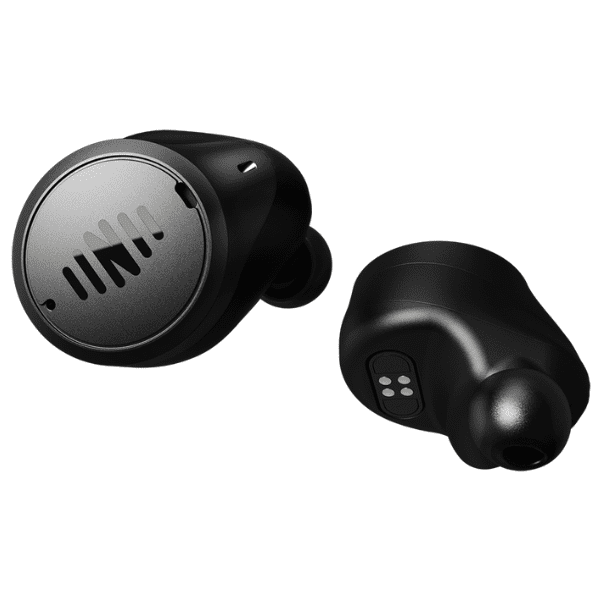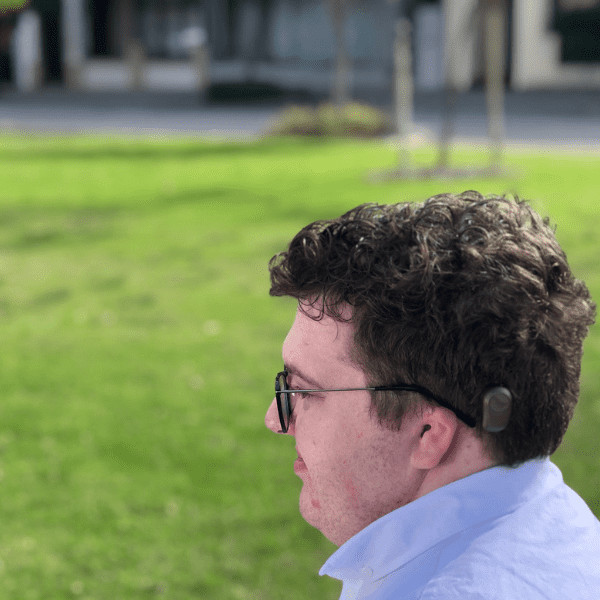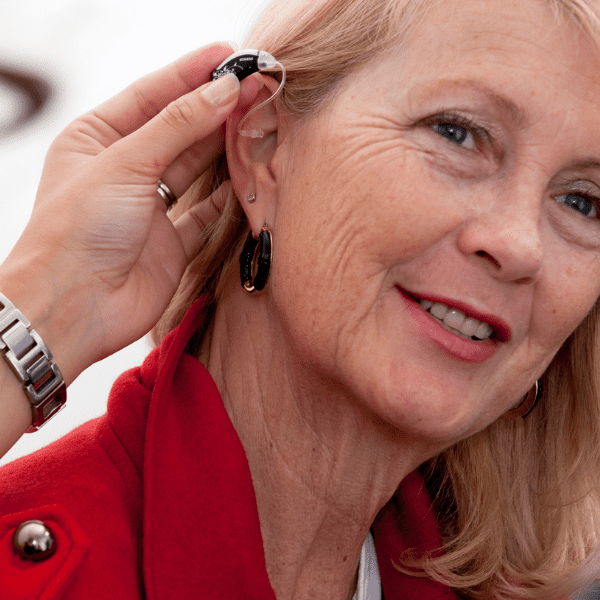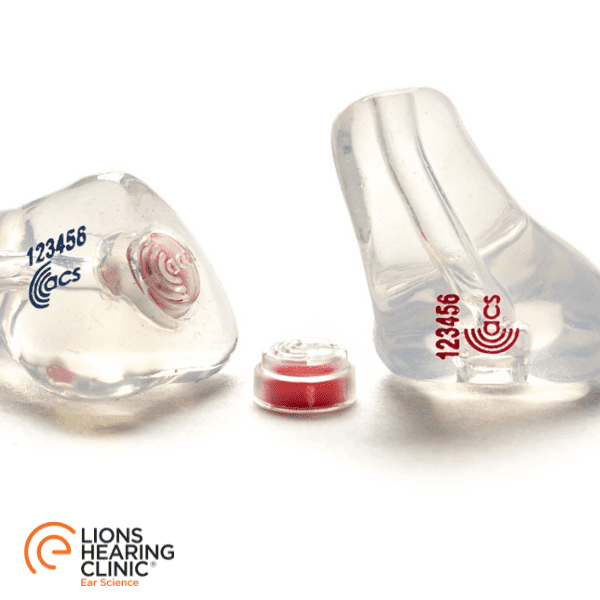What type of hearing device and management is suitable for you?
Hearing device and management options vary and depend on many factors such as stage of hearing loss, your ear’s anatomy, your budget, aesthetics and the features you need to suit your lifestyle.
Our Lions Hearing Clinic Audiologist review and recommend a hearing plan that considers the full spectrum of treatment options, including non-surgical, surgical and combination treatments.
Your Audiologist will work with you to ensure you understand all the options available to you and make a recommendation from a comprehensive range of hearing devices.

Hearables
If you have mild hearing loss hearables might give you the support you need.
Hearables can assist with general hearing health and other listening situations like streaming music. You could benefit from using a hearable if you have normal to mild hearing loss.
Depending on which specific hearable you use, it should be much easier to hear people talking, TV shows, music, announcements, and any other sounds you might encounter daily.
Brands: Nuheara

Prescription hearing aids
Modern hearing aids are packed full of technology to support your hearing with comfort and clarity.
Several hearing aid styles, including behind-the-ear, in-the-ear, and invisible hearing aids, are available to treat all types of hearing loss, including conductive, sensorineural, and mixed hearing loss. All hearing aids offer a range of sophisticated features and options to suit your hearing and lifestyle needs.
Find out more on our LIVE WELL range of hearing aids that will give you the motivation & safety to live your best life.
Brands: Phonak, Unitron, Oticon, Starkey, and GN Resound
Common hearing aid features include:
- Feedback cancellation to stop annoying whistling
- Noise reduction to enhance the clarity of speech in background noise
- Speech enhancement to hear speech clearly
- Waterproof devices to give you the confidence to use your device near the water
- Rechargeable options for convenience
- Directional microphones to hear in background noise and crowds
- Multiple and automatic programming to suit a range of listening situations
- Connectivity to mobile and other Bluetooth devices for easy handsfree use
Hearing technology advances yearly, so check in with your trusted Audiologist on the latest technology to suit your hearing and lifestyle needs.

Cochlear implants
If hearing aids aren’t powerful enough, a cochlear implant may be the right choice for you.
Hearing aids help many people, but as your hearing loss progresses, a cochlear implant may give you the clarity and volume you need to understand speech again.
Cochlear implants can be life-changing devices that can help you hear sounds you no longer hear with your hearing aids.
Brands: Cochlear, MED-EL, & Advanced Bionics

Bone conduction & middle ear implants
These implants may be considered if you have allergies, ears that don’t physically support a hearing device or problems with the small bones (ossicles) in the middle ear.
These implants allow you to hear sounds, picked up through the sound processor worn slightly behind the ear, leaving your ear canal open and free from moulds or domes and bypassing any problems in the ear canal or middle ear. Like a hearing aid, bone conduction and middle ear implants produce acoustic sound.
These devices are best used for people whose cochlear (bone conduction) hearing is relatively good.
Brands: Cochlear, MED-EL, & Oticon Medical

Combined hearing solutions, with a hearing aid and an implant
Combined or bimodal hearing solutions have a hearing aid in one ear and a hearing implant in the other.
Your hearing can be a richer and more natural hearing experience than with hearing aids or cochlear implants alone.
With a bimodal hearing solution, you may experience clearer sound, improved ability to hear music, and enhanced speech understanding, especially in noise. You may be better able to identify the direction of sounds.
Brands: Various

Assistive listening devices (ALDs)
ALDs can be used with or without other hearing devices and help improve hearing ability and awareness in specific listening situations.
ALDs can be used with or without hearing aids to provide extra support in specific listening situations. Such as listening over the telephone, with noisy backgrounds, in small or large group listening settings (such as restaurants, concert halls and movie theatres), and when you are at a distance from the sound source.
Brands: Audeara, Sennheiser, Phonak, GN Resound, Cochlear, Bellman & Symfon

Protect your hearing with customised solutions
It is important to use hearing protection if you are exposed to noise, but the type of earplugs you need depends on the noise you are exposed to.
- Hearing protection earplugs
- Musicians earplugs
- Sleep earplugs
Brands: Phonak, GN ReSound and Pacific Ears
Hearing Aid FAQs
In Australia, free hearing aids are available to eligible individuals under the Australian Government’s Hearing Services Program. This includes pensioners, veterans, and some children and young adults with specific hearing needs. Eligibility criteria may vary, so it’s important to check with the program or your audiologist to determine if you qualify.
Hearing aids come in various styles, including behind-the-ear (BTE), in-the-ear (ITE), and completely-in-canal (CIC). Each type offers different benefits depending on the degree of hearing loss, lifestyle needs, and personal preferences. Your audiologist will help you understand which type best suits your specific hearing condition and daily activities.
In Australia, hearing aids typically range from $1,000 to $5,000 per device, depending on the level of technology and features. Some private health insurance plans may cover part of the cost, and eligible individuals might receive free or subsidised devices through government programs. It’s advisable to discuss all options with your audiologist.
Hearing aids cannot restore hearing completely, but they significantly improve hearing ability by amplifying sounds and enhancing speech clarity. While they don’t cure hearing loss, modern hearing aids can greatly enhance your quality of life by helping you hear better in various environments, from quiet conversations to noisy social gatherings.
Choosing the right style of hearing aid depends on factors like your level of hearing loss, lifestyle, and personal comfort. Behind-the-ear models are versatile and powerful, while in-the-ear options are more discreet. Consult with your audiologist to evaluate the pros and cons of each style, ensuring the best fit for your needs.
Yes, many hearing aids can be customised to match your skin tone or hair colour, providing a more discreet appearance. Customisation options vary by brand and model, so discuss your preferences with your audiologist. This personalisation can help you feel more comfortable and confident wearing your hearing aids in daily life.
Yes, hearing aids will likely need adjustments over time as your hearing needs change. Regular follow-up appointments with your audiologist are important to fine-tune the settings, ensuring optimal performance. Additionally, as new technology becomes available, you may need to update or upgrade your devices to maintain the best hearing experience.
Due to current wait times to receive children’s hearing aid assessment services, Lions Hearing Clinic is unable to take new bookings for children’s clinical services.


